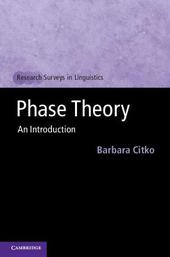
|
Phase Theory: An Introduction
Paperback / softback
Main Details
| Title |
Phase Theory: An Introduction
|
| Authors and Contributors |
By (author) Barbara Citko
|
| Series | Research Surveys in Linguistics |
|---|
| Physical Properties |
| Format:Paperback / softback | | Pages:238 |
|
| Category/Genre | Grammar and syntax |
|---|
| ISBN/Barcode |
9781107612433
|
| Classifications | Dewey:415 |
|---|
| Audience | | Professional & Vocational | |
|---|
|
Publishing Details |
| Publisher |
Cambridge University Press
|
| Imprint |
Cambridge University Press
|
| Publication Date |
15 December 2022 |
| Publication Country |
United Kingdom
|
Description
Phase Theory is the latest empirical and conceptual innovation in syntactic theory within the Chomskyan generative tradition. Adopting a cross-linguistic perspective, this book provides an introduction to Phase Theory, tracing the development of phases in minimalist syntax. It reviews both empirical and theoretical arguments in favor of phases, and examines the role phases play at the interface with semantics and phonology. Analyzing current phasehood diagnostics, it applies them in a systematic fashion to a broad range of syntactic categories, both phases and non-phases. It concludes with a discussion of some of the more contentious issues in Phase Theory, involving cross-linguistic variation with respect to phasehood and the dynamic versus static nature of phases.
Author Biography
Barbara Citko is Associate Professor of Linguistics at the University of Washington.
Reviews'The future has arrived! Modern syntactic theorizing now has its own up-to-date manual. Citko does an excellent service to the field with this superb, much needed introduction to Phase Theory.' Kleanthes K. Grohmann, University of Cyprus 'In this comprehensive critical survey that clearly explains and evaluates a core theoretical concept, Citko addresses the history, empirical motivations, and current uses of the phase. A hugely useful resource.' David Adger, Queen Mary, University of London 'Comprehensive and well written, Citko's book is an excellent state-of-the-art review of the notion of phases in the Minimalist Program. Readers will have a very clear idea of why phases have become such a hotly discussed issue and feel enticed to participate in the debate. The book is a must-read reference not only for students being acquainted with Minimalism, but to anyone interested in current syntactic theory and the syntax-semantics and syntax-phonology interfaces.' Jairo Nunes, Universidade de Sao Paulo
|